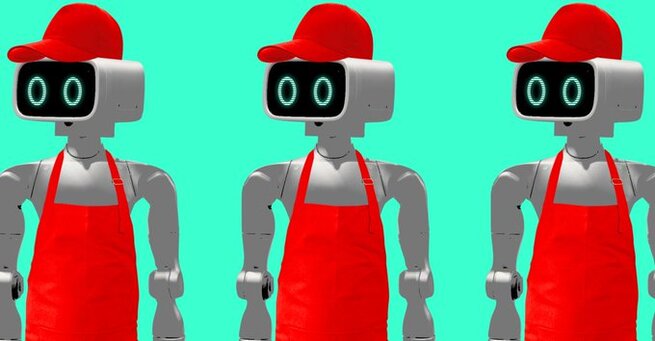Alerts

Right now, there are robots stocking convenience store shelves in Japan. America hasn’t fully embraced that yet — but let’s be real, it’s coming. Walmart and 7-Eleven are already experimenting with automation, and as machine vision and AI improve, it’s only a matter of time before robots take over the few remaining teen jobs.
The uncomfortable truth is this: there just aren’t many jobs for teens anymore. In August 2000, over 52% of Americans aged 16–19 were active in the labor force. Fast-forward to August 2025, and that number has dropped to just 34.8%.
That’s not a minor shift — it’s an economic warning sign. And much of it points to one culprit: technology.
For decades, tech companies promised efficiency and opportunity. But what they delivered was a future where even entry-level work — the traditional starting point for teens — is being erased by machines.
From self-checkout kiosks to robot fry cooks, automation has quietly edged out human labor, replacing part-time student jobs with AI-driven systems. And now, it’s not just the manufacturing lines or burger grills — it’s customer service, grocery delivery, and even retail.
Teens, once the backbone of the summer workforce, are being pushed to the sidelines.
As Harry J. Holzer, senior fellow at the Brookings Institution, notes, automation “shifts compensation from workers to business owners, who enjoy higher profits with less need for labor.”
For consumers, there’s little upside. Your burger isn’t tastier or cheaper just because a robot made it. But for the companies behind those machines — like RoboBurgers.AI — every automated task means another dollar saved in wages and another boost in profit margins.
It’s efficiency for shareholders, not opportunity for society.
When teens don’t enter the workforce early, it’s not just about missing out on pocket money. It’s about losing the soft skills — teamwork, responsibility, time management — that shape future workers.
By stripping away those early opportunities, tech isn’t just taking jobs; it’s reshaping the social fabric that taught generations how to work.
And while the tech industry frames this as “progress,” the truth feels much colder: tech left teens fighting over scraps, and now it wants those too.
This isn’t simply a story about automation. It’s about access — who gets to participate in the economy of the future. When algorithms and robots replace entry-level jobs, teens lose the chance to build résumés, earn independence, and learn essential skills.
What’s left is a generation that feels disconnected from the workforce before they even enter it. And once you’ve been excluded from the start, catching up later is nearly impossible.
Automation isn’t inherently evil. But when efficiency comes at the cost of opportunity, we need to ask harder questions about what kind of society we’re creating.
Because if the tech industry keeps optimizing for profit over people, we’ll end up with a world where humans — especially young ones — are no longer needed.
And that’s not innovation. That’s neglect.
𝗦𝗲𝗺𝗮𝘀𝗼𝗰𝗶𝗮𝗹 𝗶𝘀 𝘄𝗵𝗲𝗿𝗲 𝗿𝗲𝗮𝗹 𝗽𝗲𝗼𝗽𝗹𝗲 𝗰𝗼𝗻𝗻𝗲𝗰𝘁, 𝗴𝗿𝗼𝘄, 𝗮𝗻𝗱 𝗯𝗲𝗹𝗼𝗻𝗴. We’re more than just a social platform — from jobs and blogs to events and daily chats, we bring people and ideas together in one simple, meaningful space.
